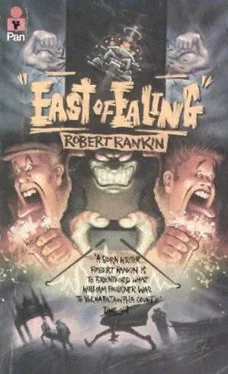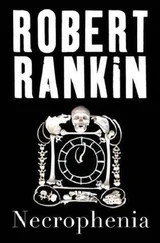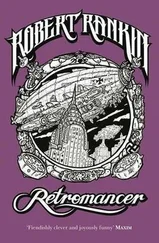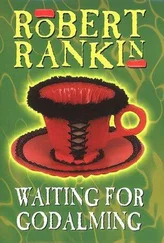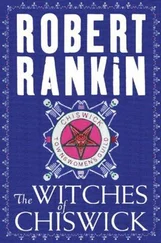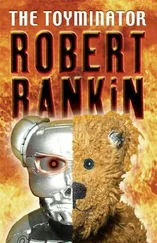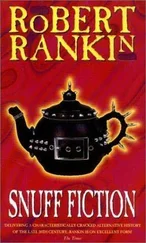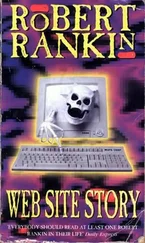Robert Rankin - East of Ealing
Здесь есть возможность читать онлайн «Robert Rankin - East of Ealing» весь текст электронной книги совершенно бесплатно (целиком полную версию без сокращений). В некоторых случаях можно слушать аудио, скачать через торрент в формате fb2 и присутствует краткое содержание. Жанр: Современная проза, на английском языке. Описание произведения, (предисловие) а так же отзывы посетителей доступны на портале библиотеки ЛибКат.
- Название:East of Ealing
- Автор:
- Жанр:
- Год:неизвестен
- ISBN:нет данных
- Рейтинг книги:3 / 5. Голосов: 1
-
Избранное:Добавить в избранное
- Отзывы:
-
Ваша оценка:
- 60
- 1
- 2
- 3
- 4
- 5
East of Ealing: краткое содержание, описание и аннотация
Предлагаем к чтению аннотацию, описание, краткое содержание или предисловие (зависит от того, что написал сам автор книги «East of Ealing»). Если вы не нашли необходимую информацию о книге — напишите в комментариях, мы постараемся отыскать её.
East of Ealing — читать онлайн бесплатно полную книгу (весь текст) целиком
Ниже представлен текст книги, разбитый по страницам. Система сохранения места последней прочитанной страницы, позволяет с удобством читать онлайн бесплатно книгу «East of Ealing», без необходимости каждый раз заново искать на чём Вы остановились. Поставьте закладку, и сможете в любой момент перейти на страницу, на которой закончили чтение.
Интервал:
Закладка:
“So what have you seen, Soap?”
“They are starving out there.” Soap’s pink eyes darted up at his inquisitor.
“You’re joking, surely?”
“I am not. Since the institution of the new non-monetary system of exchange the entire country is literally in a state of civil war.”
“Come now,” said Jim. “What you mean is that a few die-hards are giving two fingers to the printed-palm brigade. Bloody good luck to them I say. I’ll arrange to have a couple of million drawn out. You take it with my blessings.”
“Money won’t do it,” said Soap. “Paper currency is illegal. All assets were instantly frozen on the day of the change. Each individual had to hand in his cash to the bank upon his turn for registration. Those who refused to submit to the change found every door closed to them. They could not travel upon buses or trains or buy petrol for their own cars; nor milk from the milkman, nor bread from the bakers. Their friends and neighbours rejected them. Even members of their own families, those who had the mark, refused them. They were ostracized totally from society. Many went straight to the banks but were told that they had missed their opportunity and that was that.”
“And that no man might buy or sell, save he that had the mark or the name of the beast or the number of his name,” said Jim Pooley in a leaden voice.
“The very same.”
“The callous bastards,” said John Omally. “So what happened then?”
“Exactly what you might expect. Open rebellion on the part of the unmarked. What they could no longer buy they took. There was looting and burning and killing. Much killing. Under the direction of the Government’s master computer martial law was imposed. The computer issued a brief edict: all those who do not bear the mark to be shot on sight.”
“Are you making this up, Soap?” Omally leant forward in his seat and waggled his fist threateningly beneath the hollow Earther’s all-but-transparent nose. “Jim and I have both sussed that something pretty pony is going on here. Although we are trapped by a seemingly impenetrable barrier, the shops never run dry. There is always milk and fags, bread and beer, although that is tasting a bit odd of late. It must all be coming in from the outside, although we haven’t figured out exactly how as yet. Parachutes in the dead of night we suspect.”
“You’re on a wrong’n,” said Soap. “Nothing gets in or out except me. And there’s no food going begging out there either.”
“So how do you account for it then?”
“It is all manufactured right here in the parish.”
“Oh rot,” said Jim. “Do you see any cows grazing in the Memorial Park, or any hop fields or tobacco plantations? Talk sense, Soap, please. How could any of it be made here?”
“It is all artificially produced. Every last little thing, it’s all synthetic. Including your manky beer.” Soap pushed his glass aside. “I can’t tell you how it’s done but I can tell you who’s doing it.”
“Lateinos and bloody Romiith,” said Omally in a doom-laden voice.
“None other. What do you think the walls are up for anyway?”
“To keep us in,” Jim said gloomily. “To keep me in and stop me spending my money.”
“Wrong,” said Soap. “To keep the others out. Those walls were whipped up to protect the master computer complex in Abaddon Street. It is the centre of the whole operation.”
“They got my antique bedstead, the bastards,” snarled Omally, “and now my beer also. Will it never end?”
“But why is this master complex in Brentford?” Jim asked. “I’d always pictured Armageddon getting off to its first round in a somewhat more Biblical setting. The gasworks and the flyover just don’t seem to fit.”
“You’ll have to ask the Professor about that,” said Soap. “Or possibly your man there.” Soap stretched out a pale hand towards the tall, gaunt spectre wearing long out-moded tweeds and smoking a Turkish cigarette who now stood majestically framed in the Swan’s famous portal.
“Gentlemen,” said Mr Sherlock Holmes, gesturing to the three seated figures, two of which were now cowering away and seeking invisibility, “if I might just prevail upon your aid in a small matter.”
“And there was I utterly convinced that things could get no worse,” said John Omally. “Oh foolish fellow me.”
18
Sherlock Holmes strode up the Ealing Road, his cigarette billowing smoke about his angular visage. Pooley and Omally plodded behind, and had they chosen to pause a moment and look around they might just have caught sight of the manhole cover which closed upon Soap’s retreating form.
“I merely wish you to be close at hand,” said Sherlock Holmes as he marched along. “Just button your lips and hang loose, got me?”
Pooley, who had recently purchased for the detective an advanced video recorder and the complete series of Basil Rathbone cassettes, thought to detect the hint of an American accent creeping into the Victorian voice. “Oh, gotcha,” he said.
Outside Norman’s corner-shop Holmes drew to a sudden halt. His two followers did likewise and peered without enthusiasm through the spotless plexiglass of the new aluminium-framed door to where Norman stood behind his shining counter. The true shopkeeper was busy in his kitchenette, bent low over a set of indecipherable plans scrawled on to the innards of a cornflake packet. He scarcely heard the shopdoor-bell chime out an electronic fanfare. His double peered up from the countertop computer terminal and surveyed his three potential customers. The Irish one, cowering to the rear, owed, he recalled. Clearing his throat with a curiously mechanical coughing sound, he asked, “How might we serve you, gentlemen?”
“We?” queried Sherlock Holmes.
“The plurality is used in a purely business sense,” the robot replied. “We, the interest, which is Norman Hartnell, corner shop, as a small concern, realize the need to extend a personal welcome to the prospective client in these competitive times.”
“Very precise,” said Sherlock Holmes. “An ounce of Ships, if you please.”
“Certainly, sir.” The robot slipped his hand behind his back and drew out the packet. Omally considered that to be a pretty sneaky move by any reckoning.
“You have redecorated your premises, I see,” said Holmes.
Considering this to be a simple statement of fact which required no reply, the robot offered none.
“And all achieved with the left hand.”
The creation stiffened ever so slightly but retained its composure, although a fleeting look of suspicion crossed its face. Pooley and Omally both stepped back unconsciously.
“I was always given to understand that you were right-handed,” Holmes continued.
“That will be eighteen shillings and sixpence, please, sir.” The robot stretched forward both hands, that he might exhibit no personal preference.
“Put it on my slate, please,” said Sherlock Holmes.
Beneath his breath John Omally began to recite the rosary.
Holmes’ deadly phrase clanged amongst the robot’s network of inner circuitry and fed out the word “Dimac” in any one of a dozen known languages. “Eighteen shillings and sixpence, please,” he said. “The management regret that…”
“So I have been given to understand,” said Holmes. “If it is not inconvenient, I should like a word or two with the management.”
“I am it.” The robot pressed his hands to the countertop and prepared to spring over. “Kindly hand me the eighteen shillings and sixpence.”
“I think not,” said Sherlock Holmes. “Let us not bandy words, please. If the real Norman Hartnell still draws breath then I wish to speak with him. If not, then I am making a citizen’s arrest.”
Читать дальшеИнтервал:
Закладка:
Похожие книги на «East of Ealing»
Представляем Вашему вниманию похожие книги на «East of Ealing» списком для выбора. Мы отобрали схожую по названию и смыслу литературу в надежде предоставить читателям больше вариантов отыскать новые, интересные, ещё непрочитанные произведения.
Обсуждение, отзывы о книге «East of Ealing» и просто собственные мнения читателей. Оставьте ваши комментарии, напишите, что Вы думаете о произведении, его смысле или главных героях. Укажите что конкретно понравилось, а что нет, и почему Вы так считаете.
